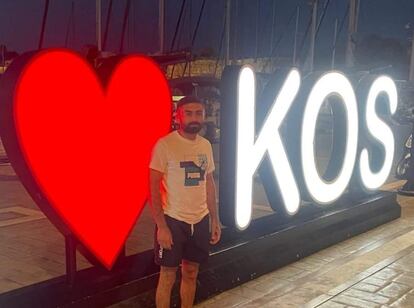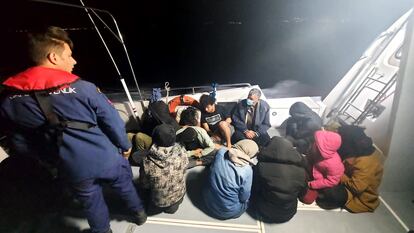Who tortured Baris Büyüksu to death?
The file of a Turkish citizen, whose body was abandoned in the Aegean Sea, after allegedly being tortured by security forces in Greece, is blocked by bureaucracy in both countries. His case is one of the most serious arising from the alleged violations of human rights at the hands of the Hellenic Coast Guard

On October 22, 2022, the Turkish Coast Guard spotted a boat drifting in the waters of the Aegean Sea, between the coast of Bodrum (Turkey) and the island of Kos (Greece). Although it didn’t seem like it at first glance, the operation would be different from the dozens that are undertaken every day to rescue migrants who are illegally returned by the Greek Coast Guard to Turkish waters.
On the lifeboat — in addition to 15 Palestinian refugees — there was a semi-conscious Turkish citizen. Upon being rescued by the Turkish officers, the first thing he asked for was water. “His voice was barely audible. He drank with difficulty,” one of the Palestinians would later recount. “Then, he passed out on the floor.” By the time they reached land, he was already dead.
Signs of torture were evident on his body, which an autopsy later confirmed. His name was Baris Büyüksu. He was 30-years-old and of Kurdish descent, born and raised in the Turkish city of Izmir.
“You don’t really know what pain is until it knocks on your door,” says Dilan, the sister of the deceased, who receives EL PAÍS in Izmir with her parents, Saime and Reyis Büyüksu. They are still mourning a year after having buried Baris. Added to the grief is the feeling of helplessness: despite the time that has passed and the investigation that was initiated by the Bodrum Prosecutor’s Office, his file is still lost in some office in Greece or Turkey, blocked in the bureaucracy of both countries.
“The most difficult thing,” Dilan continues, “is the uncertainty, the ambiguity. We know nothing, and the only possibility of an answer lies with the highest authorities. We ask for information every day… they send us from one department to another, but no one knows anything.”
At the end of September 2022, Baris Büyüksu arrived in Greece without being intercepted by the Hellenic Coast Guard. His intention was to travel to France and request asylum there. Hence, he avoided contact with the authorities, so as not to be registered in Greece. The Dublin Regulation establishes that the state responsible for examining the asylum application is the one through which the person entered the European Union (EU). During his stay on the island of Kos, Baris stayed at the home of a friend, Safak, who had applied for refugee status in Greece. However, Safak who would die a few months later in a traffic accident in Athens, thus eliminating key testimony from the investigation.
Of course, there are photographs that prove that Baris passed through Kos. “Practically every day, he called us or sent us photos so we wouldn’t worry,” his family explains. Until, suddenly, the calls stopped.
What happened next can be reconstructed thanks to the testimonies of several Palestinians who arrived in Kos on October 21, 2022. Their statements were collected in the summary prepared by the Bodrum Prosecutor’s Office. EL PAÍS has had access to the document.
Shortly after disembarking on the Greek island, the Palestinians were intercepted by half-a-dozen individuals covered in balaclavas. “They carried guns, sticks and flashlights… when these individuals captured us, they handcuffed us behind our backs, blindfolded us, and began to beat us with sticks. One or two hours later, they put us in a vehicle and took us somewhere,” declared one of the Palestinians, a 24-year-old Gazan, when the Turkish police took his statement.
Secret prisons
The building they were taken to wasn’t a police station. Several journalistic investigations have revealed the existence in Greece of extrajudicial detention centers, which are used to carry out quick deportations (the illegal expulsions of migrants). In 2021, The New York Times located an extrajudicial detention center near the Greek land border with Turkey. Last April, an investigation by the Greek media outlet Solomon revealed the location of one of these secret prisons on the island of Samos: a single-family house located in a beautiful cove with turquoise waters that, outside of the tourist season, is practically uninhabited.
The Palestinians described the house as a two-room space, although they don’t know if there were other rooms. The men, women and children were thrown into one of them, after being stripped of their money, mobile phones and even their clothes. From the other room came Baris Büyüksu’s shrill screams as he was being tortured. He had been arrested while trying to leave the island on a ferry to Athens.
“For the love of God, don’t hit me! What have I done to you?” This is what a 13-year-old Palestinian boy — who knew Turkish — claimed he heard Baris shout, according to his statement before the Prosecutor’s Office. “They beat him with great violence, his screams reached our room. We also realized that they were giving him electric shocks, from the sound of the device,” says the 24-year-old Gazan in his testimony. “They continued to torture him throughout the night.” A couple of hours before dawn, they rounded up the Turk and the Palestinians. They removed their handcuffs and blindfolds and loaded them onto a Greek Coast Guard boat, which — in open water — would abandon them in an inflatable lifeboat.
The autopsy on Baris Büyüksu confirmed injuries consistent with witness statements. The eight coroners and medical experts who signed the report “unanimously” concluded that Baris’ death occurred due to “general somatic trauma due to the fracture of several ribs and severe hemorrhage caused by bleeding in the internal soft tissues.” The autopsy considers the “causal relationship” between death and the blows received to have been proven. It rules out any other cause of death.
Missing file
After the testimony of all the witnesses — who also provided descriptions of the agents who participated in their arrests and detainment — the investigating prosecutor noted that, together with the autopsy, the evidence was sufficient to require judicial collaboration from Greece. To this end, he ordered the translation of the entire case and that it be sent to Athens. And that’s where the case came to a standstill.
Two of the lawyers handling the case — the Turkish citizen Nergiz Aslan and the Greek citizen Vicky Aggelidou — gave a joint press conference in Izmir, this past November 3, in which they denounced the fact that the file still hasn’t reached its destination. For this commission to be successful, the file must reach the Greek Ministry of Justice from the Greek Ministry of Foreign Affairs. However, the Greeks would need to receive the file from the Turkish Ministry of Foreign Affairs, which must first receive it from the Turkish Ministry of Justice.
The lawyers aren’t clear if the documentation is already in the Greek Ministry of Foreign Affairs, or if it hasn’t been sent over by the Turkish authorities yet. “The file has been sent to the Greek authorities and they’ve been asked about it twice, without receiving a response,” says a source from the Turkish Ministry of Justice, without specifying more details. The Greek authorities haven’t responded to requests for information made by EL PAÍS.
The Büyüksu family’s legal team suspects that the reason for this delay is the recent moment of good relations that the governments of Greece and Turkey are experiencing. The relationship between these two countries is always complex, often tortuous… hence, both governments take special care to maintain the periods of calm for as long as possible.
The lawyers fear that neither of them wants the case to go further. If Turkey proceeds with the case, it will be officially accusing Greek officials of having committed torture and murder.

Saime Büyüksu doesn’t care about the geopolitical balance: she just wants to clarify what happened to her son. “It’s something very difficult for the whole family to process,” she laments. Dilan — who cannot help but burst into tears when she remembers the testimonies about her brother’s torture — explains that they’re willing to move mountains in search of answers, because they want justice to be done. “We’ve begun to understand that we’re not alone, that there are other families going through similar situations. True justice would be that this isn’t repeated again.” Numerous testimonies from migrants illegally deported from Greece and collected by human rights organizations accuse Greek security forces of excessive violence and mistreatment.
“Torture is a crime against humanity. For me, it’s very difficult to understand this savagery. How can one human being do this to another? We have nothing against the Greek people or the Greek state,” says Baris’ father, Reyis, who — after remaining silent throughout the interview — begins to speak, with a tired voice and emphatic words. “The European Union boasts of being a place of justice, law and fairness… and Greece is part of this system. So, if this happens in Greece and justice isn’t done, perhaps the EU itself isn’t based on justice, but on lies.”
Sign up for our weekly newsletter to get more English-language news coverage from EL PAÍS USA Edition
Tu suscripción se está usando en otro dispositivo
¿Quieres añadir otro usuario a tu suscripción?
Si continúas leyendo en este dispositivo, no se podrá leer en el otro.
FlechaTu suscripción se está usando en otro dispositivo y solo puedes acceder a EL PAÍS desde un dispositivo a la vez.
Si quieres compartir tu cuenta, cambia tu suscripción a la modalidad Premium, así podrás añadir otro usuario. Cada uno accederá con su propia cuenta de email, lo que os permitirá personalizar vuestra experiencia en EL PAÍS.
¿Tienes una suscripción de empresa? Accede aquí para contratar más cuentas.
En el caso de no saber quién está usando tu cuenta, te recomendamos cambiar tu contraseña aquí.
Si decides continuar compartiendo tu cuenta, este mensaje se mostrará en tu dispositivo y en el de la otra persona que está usando tu cuenta de forma indefinida, afectando a tu experiencia de lectura. Puedes consultar aquí los términos y condiciones de la suscripción digital.








































